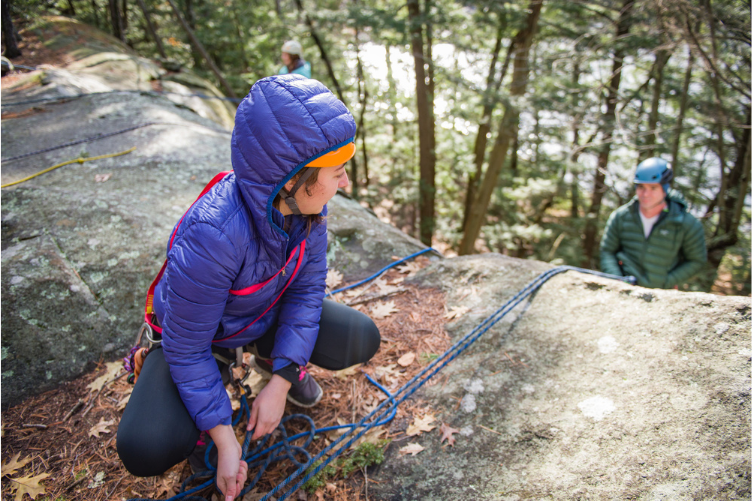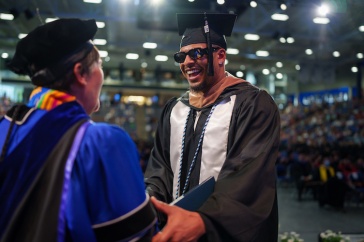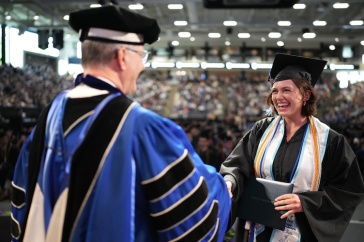
This Fall, the outdoor education program at UNH transitioned from the department of kinesiology to the department of recreation management and policy and became outdoor leadership and management (OLM). While the wording is subtle, the transition brings comprehensive opportunities for students interested in leadership roles in outdoor education and recreation, adventure programming, parks and protected areas, youth and after-school programming and conservation. And the timing of the program’s expansion into the growing outdoor industry couldn’t be better.
During the COVID-19 pandemic, a sharp increase in popularity of all types of outdoor recreation has understandably increased the need for educated professionals in that industry.
“We’ve always known how important the outdoors is to all aspects of people’s lives, but during the COVID-19 pandemic we’ve seen a greater realization of this by the public,” says Nate Fitch, senior lecturer and coordinator of the outdoor leadership and management program. “Signs of what we are calling the ‘outdoor renaissance’ have already begun, as we’ve seen a drastic increase in the number of people who are searching for natural, outdoor spaces that support their mental and physical health. This explosion of popularity means there is an even greater need for leadership professionals in the outdoor industry.”
And the trend doesn’t appear to be going away anytime soon.
"The state's natural resources - open spaces, mountains, lakes, rocks and ocean - provide the perfect environment to prepare for an outdoor career."
The outdoor recreation industry has become one of the largest economic sectors in the United States; in 2017, the outdoor recreation economy generated $887 billion in consumer spending and directly supported more than 7.5 million jobs in the United States. In New Hampshire, outdoor recreation provides $528 million in annual state tax revenue and $8.7 billion in consumer spending, which combines to support 79,000 jobs.
The OLM program increases UNH’s ability to provide current and incoming students with a more extensive program, and positions the university to better serve New Hampshire’s workforce and community needs.
“New Hampshire has a prolific outdoor history and a well-established outdoor industry (that is looking to expand),” says Fitch. “The state’s natural resources – open spaces, mountains, lakes, rocks and ocean – provide the perfect environment to prepare for an outdoor career.”
Students interested in outdoor industry careers are taking advantage of UNH’s geographic location and the OLM program, which is the oldest continually accredited outdoor education program in the country, with alumni working in virtually every aspect of the industry.
  |
| Zach Brogan '24 |
Zach Brogan ’24 is from Hopkinton, New Hampshire and has been involved with rock climbing since the 7th grade. In the summer of 2019, a high school scholarship allowed him to attend the Hurricane Island Outward Bound School in Newry, Maine.
“These outdoor activities that I was a part of sealed the deal for me, and that was why I wanted to get an education that was based around the outdoors,” he says. “Looking ahead, I would like to get involved with search and rescue.”
Brogan sees the pandemic as a positive for those interested in working in the outdoor industry.
“More outdoor leaders will be needed to guide and teach programs like rock climbing, hiking and kayaking,” he says. “This program provides an array of courses leading to a degree that will open up outdoor career opportunities that many people may not know exist.”
For Isabelle Zytka ’23, the opportunity to work outdoors in a plethora of areas is what appealed to her. The West Hartford, Connecticut native came to UNH to pursue an education that would allow her to work with others in an outdoor setting. “There are so many different paths that this major allows, and I’m able to explore them through the classes offered, which has been so helpful,” she says.
  |
| Isabelle Zytka '23 |
Zytka suggests that students who are thinking about the outdoor leadership and management program take a class that looks interesting, or simply reach out to one of the faculty members. “The community within the department is what really differentiates the program from others. It’s always positive and welcoming.”
Looking ahead? Zytka says, “I really hope that people who got into new recreational actives [during the pandemic] continue to enjoy them years down the line, as well as educate themselves about how to recreate safely and follow guidelines, so that the generations coming after us can continue to enjoy them in the environment that we are able to.”
-
Written By:
Callie Carr | UNH College of Health and Human Services | callie.carr@unh.edu | 603-862-0970



















































